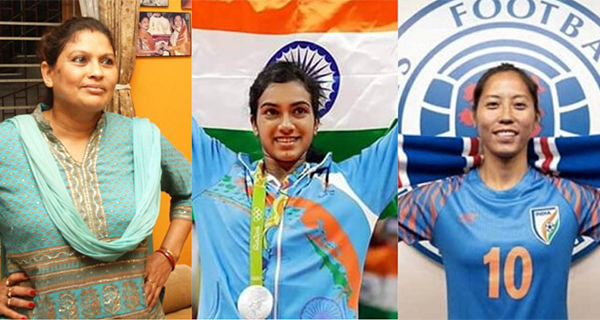CALCUTTA (India): Indian women’s success stories in international sports including the Olympics in the last two decades has changed the lives of most marginalized girls and young women in the country.
Sport has become one of the great drivers of gender equality as it has taught women and girls the values of teamwork, self-reliance and resilience.
Footballer Bala Devi’s recent signing for Rangers FC, and badminton star PV Sindhu’s world title last year are two landmark achievements by Indian women athletes.
Mother did not like my love for football: Shilky.
India’s U17 team captain Shilky Devi said that she was lucky enough to have ‘understanding’ parents.
“My father owns a stationery shop in our village in Moirang in Manipur. I’ve two brothers and one sister. I’m the eldest among my siblings. Initially, my mother did not like me to play football. She often said that girls should not play football. However, that changed with time and, she’s extremely supportive of my ambitions,” Shilky told Khel Updates.
The United Nation (UN) successfully launched One Win Leads to Another (OWLA), a joint partnership between UN Women and the International Olympic Committee (IOC) which formed a legacy of the 2016 Olympic Games in Rio de Janeiro.
The UN aimed to provide the girls with social connections and a refuge from violence in their homes and communities through this programme.
“Bala-di is undoubtedly the best player in our region. Her professional contract inspires not only the Indian players, but every woman player in the SAFF region,” said Nepali footballer Anita Basnet, who is plies her trade with Madurai-based club.
Wearing swimming costumes was a big challenge: Bula
Former national swimming champion Bula Chowdhury, 50, however, said, that things have changed vastly since she started off her career.
“Wearing swimming costumes was a big challenge. My parents had to hear a lot from their relatives, friends and neighbours. ‘How can you let a girl wear swimsuit?’. But with my parents stayed firm, I was able to take dip into the pool,” said Chowdhury, who represented the country at 1982 Asian Games when she was just 12.
Chowdhury is revered as the Queen of Oceans, and her achievement of crossing seven seas is yet to be broken.
“Women has a lot of freedom today. They can do their work independently but it didn’t exist in our times. The taboo kept the women and girls confined within the four walls in their homes. If I had to go out, I had to take permission from my parents,” she added.
Gender equality at 2012 London Olympics
The London 2012 Olympic Games turned out to be a significant one for the female athletes. For the first time, with two exceptions (Republic of Nauru, St Kitts and Nevis), all competing nations had women athletes.
In fact, there was a higher percentage of female Olympians than at any previous Summer Olympics. For the first time, there were women competitors in every sport.
Significantly, also for the very first time, each of the member countries of the Gulf Cooperation Council (GCC) had at least one woman in its Olympic team.
Former India cricketer Priyanka Roy, 31, played with the boys before she made huge strides with Bengal and national team.
“I was hooked to cricket by watching the game in the neighbourhood. Then I started playing with the boys. Thereafter, my journey started and I played for India for three years,” said Roy, who has played 21 ODIs and five Twenty20 Internationals including 2009 ICC Women’s World Cup.












Hi. Good morning sir… Your article is very good..shall I carry the same in my SPORTS News weekly.. Pl let me know.. My mob. P. 94820 18500
Yes. No problem. Give us the credit.